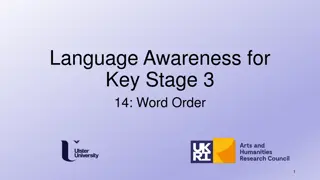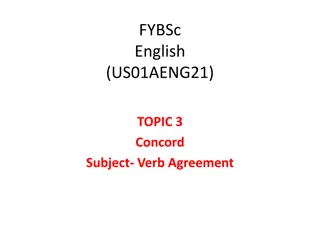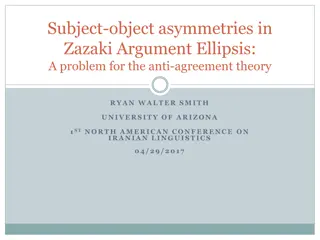
Mastering Subject-Verb Agreement in English Grammar
Understanding subject-verb agreement is crucial in English grammar, where verbs must align with their subjects in number and person. Learn the rules governing singular and plural nouns, compound subjects, and special cases to improve your writing and communication skills.
Uploaded on | 0 Views
Download Presentation

Please find below an Image/Link to download the presentation.
The content on the website is provided AS IS for your information and personal use only. It may not be sold, licensed, or shared on other websites without obtaining consent from the author. If you encounter any issues during the download, it is possible that the publisher has removed the file from their server.
You are allowed to download the files provided on this website for personal or commercial use, subject to the condition that they are used lawfully. All files are the property of their respective owners.
The content on the website is provided AS IS for your information and personal use only. It may not be sold, licensed, or shared on other websites without obtaining consent from the author.
E N D
Presentation Transcript
SUBJECT VERB AGREEMENT
The grammatical relationship between a subject and a verb is called subject verb agreement. The verb must agree with its subject in number and person.
A finite verb agrees with its subject in number and person. Ex: I am wrong She is writing a letter. He likes dancing. They like dancing.
The singular form of a count noun that act as the subject of a verb, takes a singular verb. The plural form of a count noun that act as the subject, takes a plural verb. Ex: The engine runs smoothly The engine run smoothly.
Two or more singular subject joined by and take a plural verb. Ex: Abi and sheela are great friends. A carpenter and a blacksmith live in our street.
But if two nouns joined by and refer to the same person or thing or suggest one idea to the mind, the verb must be singular,. Ex: Slow and steady wins the race. Curry and rice is my favourite dish.
When a singular subject joined to another subject by with, as well as, besides, and not together with, along with, no less than and other similar expressions, the verb is singular. Ex: Silver as well as gold is a precious metal.
Two singular subject joined by either/or or neither/nor takes a singular verb. Ex: Neither Harish nor his brother is to blame.
Each, every, every one, anybody, eithet, neither, no one, nobody follows a singular verb. Ex: Each of the boys was given a pen. Everyone in the college is displined. Either of the candidates has stolen the book.
When two nouns are qualified by each or every, although connected by and, takes a singular verb. Ex: Every boy and every girl was given a silver medal
Some nouns that plural in form, but singular in meaning, take a singular verb. Ex: The news is false. Mathematics is a difficult subject.
A collective noun takes a singular verb when the considered as a whole. It takes a plural verb when the individual of the noun are considered. Ex: The crew is large The crew were rescued. collection is
Tools and articles with two equal parts are considered plural nouns. Ex: The scissors are kept inside. My grandma s spectacles are missed somewhere.
Some of, great deal of a lot of lots of most of one fourth of take a plural verb when they refer to a number. Ex: Plenty of roses are there in my garden. Most of the students have come for annual day function.
The pronouns every body, some one, something, no one, nobody, are followed by singular verb but none can be followed by both singular and plural verb. Ex: Somebody is at the door. No one in the class is interested in mimicry.
When the plural noun denotes some specific quantity, then the verb is singular. Ex: Hundred rupees is a small amount for her. 24 hours is not enough to complete this assignment.
Many a takes a singular verb. Ex: Many a true word is spoken in jest.






















